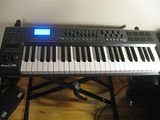NICE!GaijinPunch, in the [url=http://shmups.system11.org/viewtopic.php?p=610122#p610122]Awesome stuff you've just bought (+pics please)[/url] thread, wrote:Now just to find the time to learn it
curious why you got that rather than an MPC? price range is in line with an MPC1000, but how does the hardware/software compare?
ive heard mixed reviews on it, but the main complaint ive heard is the workflow sucks compared to working with an MPC....and it doesnt have many of the tried and true features/selling points of an MPC....after all, maschine is just a controller for 'MPC styled software', but missing some stuff that really make the MPC great....when i work with an MPC i fly through stuff because its all there and the interface just flows nicely....i find as soon as i involve computers it slows me down to a crawl
ive basically stepped away from using software and computer based stuff for my music production....the endless tweaking with vst's and shit are just time wasters for me.....too many options, too many distractions....im much happier and productive working with just hardware...i just use the computer for recording now, and im actually looking at some multitrackers to get rid of that too
i know with the kind of tunes you work with, computer based production is kinda key, but for me i love being able to do everything without having to even turn on a computer
hardware ftw!
but ya.....let me know your thoughts on it once you have put some time into it
also, if you havent worked with an MPC before, watch some tutorial vids (so you get the basics of the interface) then go try one in store.....me thinks you will be impressed with the ease of use and how much it can actually do without involving any other gear or software
<moved select posts from the Awesome stuff you've just bought (+pics please) thread to the new discussion thread Udderdude made (originally starting here). -inc.>

 | My games -
| My games - 



